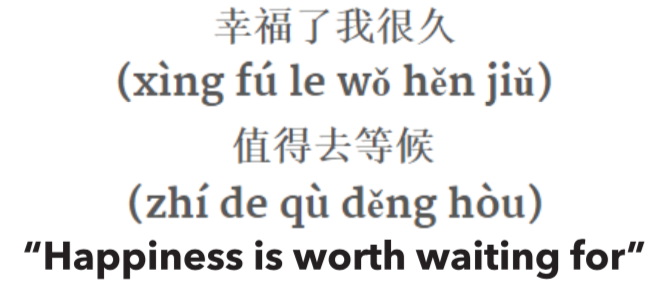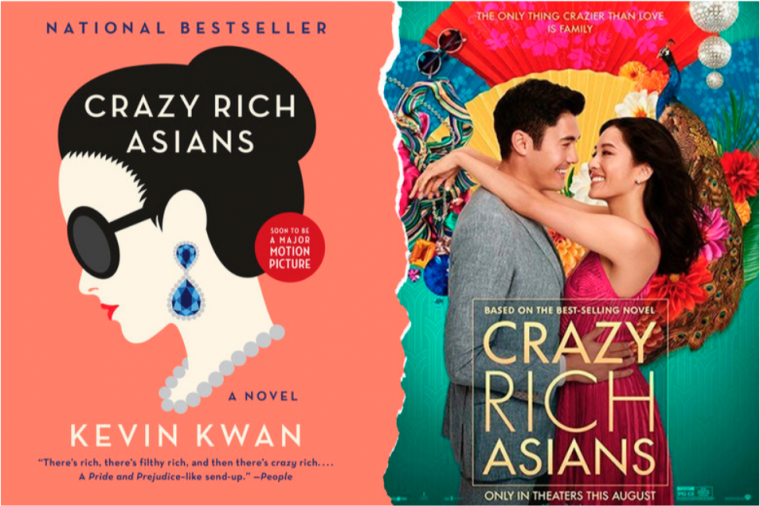Cadenza | Movie Review
How ‘Crazy Rich Asians’ played with my emotions
As I walked into the 8:45 p.m. showing of the year’s biggest romantic comedy, sparse seats were available. We had just missed the 7 p.m. showing (it was sold out), and some of us still had bulletin boards left to finish as part of our resident adviser training. We were exhausted and slightly stressed.
Yet as one RA said, “F— it! Let’s go!” It was opening weekend.
Normally, I never go to opening weekend movies. The last time I had done so was for “The Hunger Games: Mockingjay Part 1.” I’m the kind of person who catches up on all the latest pop culture references through binge-watching movies on long airplane rides. This time, however, was different. I was that obnoxious girl who posted almost daily on social media in the week leading up to the opening of “Crazy Rich Asians.” My Facebook cover photo AND my cell phone background were the “Crazy Rich Asians” movie posters, showing Rachel Chu looking longingly at Nicholas Young. When people asked me why, I jokingly asked them, “Well, why were you looking at my phone?”
That was the point. Maybe I was a little too eager and overly dedicated, but I changed my phone background because this movie needed all the advertising—both outright and subtle—and the over-the-top enthusiasm it could get. “Crazy Rich Asians” is the first major feature film to feature an all-Asian cast since “The Joy Luck Club” premiered in 1993, 25 years ago. It was not a period piece, but a contemporary one. As someone who grew up never seeing anybody who looked like her on television and in movies, except for Brenda Song on “The Suite Life of Zack & Cody,” “Crazy Rich Asians” meant something to me. Opening weekend numbers could show producers and future script-writers that Asians could tell a good story and also bring in the money.
And from the initial jazzy old Chinese tunes with a contemporary flair, I was in for a roller coaster. I don’t cry in movies, but throughout “Crazy Rich Asians” I felt a multitude of emotions, from pride to disgust to pure joy and laughter.
First, the soundtrack: Oh my goodness, I loved the jazzy twist. It just made me feel incredibly happy and upbeat. The lyrics spoke to me.
Imagine someone who has had to navigate the world of choosing when and where to speak their language in fear of judgment. Imagine constantly having to hide your identity or assimilate in order to accommodate others. Recall back to when you had to mispronounce your own name in order to make it simpler for your teacher during roll call. Imagine how awkward all of that is, and then reverse it.
Often when I meet someone for the first time, I kick-start a protection mechanism. Sometimes, I downplay parts of me in order to make myself seem less ethnic so I don’t have to feel weird and receive follow-up questions about my cultural identity. In “Crazy Rich Asians,” the people on screen were openly, unapologetically having conversations in Mandarin, Cantonese and Malay.
The fact that an American audience had to deal with subtitles for a significant portion of the multilingual film—while I had the privilege of being able to listen and understand the nuances of the conversations between Eleanor and Ah-Ma, cringe at Nick and Rachel’s mispronunciation and rejoice at the new version of Coldplay’s “Yello” sung by Katherine Ho—made the film a gratifying experience.
 Graphic by Josh Zucker
Graphic by Josh Zucker For all of those multilingual nerds like me out there, “Yellow” is a song that deserves our attention. (Spoiler Alert!) When Nick runs on the airplane to propose to Rachel, singer Katherine belts out “XingFuLeWoHenJiu, ZhiDeQuDengHou”. (“Happiness is worth waiting for”). “XingFu” roughly translates into “happiness”, but it is also a term that is difficult to fully translate into English. XingFu is a sense of contentment and satisfaction that comes from having a blessed and fulfilled life. XingFu is not part of the lyrics of the original Coldplay song, but is something idiomatic and uniquely translated to fit the Mandarin version. While Coldplay’s “Yellow” concentrates on the physical beauty of the individual and what someone would do for the ones they love, Katherine Ho’s “Yellow” focuses on the feeling of happiness, comparing it to “LiuXing”, or “shooting stars.” The high notes of XingFu come when Rachel says yes to Nick’s proposal, who (major spoiler here!) proposes with his mother Eleanor’s ring. XingFu can be a result of a journey together, through marriage. XingFu is a goal and is something that can be fleeting but also everlasting. XingFu may be individualistic but, as the movie shows, connotes approval from friends and family. XingFu is where you must reconcile passion with reason. At that moment, Katherine Ho’s “Yellow” brought my emotions to a climax. For those who understood the nuance of the words XingFu, it brought a larger satisfaction. It felt like a secret code. This, in addition to the wonderfully elaborate food rituals and the mahjong scene between Rachel and Eleanor, made the me proud to be Chinese-American.
But you do not have to be Asian to enjoy the movie or books; that is something the director and cast stressed as of high importance. Similar to how audiences bought out theaters for “Black Panther” and “Wonder Woman,” “Crazy Rich Asians” sparked a new form of activism with notable affluent Asian-Americans buying out screenings to encourage virtual strangers to go see the film, prompting the trending hashtag #GoldOpen. My theater was filled with people of all backgrounds. I was sitting next to my RA friends as well as 50 to 60-year-old white couple, who may have been “Crazy Rich Asians” book fans or out on a date night. I kept peeking to the side to gauge their reaction, hoping that they would be as pleased with the majority of the movie as I’d hoped I would be. There were numerous times in the movie when we all laughed and cheered. Who wouldn’t get all warm and fuzzy when they see their love walking down the aisle to the tune of “Can’t Help Falling in Love”?

I’m also not going to lie—I did enjoy seeing the shirtless hot Asian men in this film. Studies have shown that in America, black women and Asian men are the least desirable groups in the dating spectrum. Asian men are usually portrayed as emasculated, nerdy sidekicks without much depth. Here in “Crazy Rich Asians,” we not only get to see hot Asian men, but also hot Asian men with depth—hot Asian men kissing beautiful, kickass, strong Asian women. (For those of us who grew up in households where we never saw our parents show any physical affection, these kisses also felt like a shock. I occasionally felt embarrassed and turned away!) Because “Crazy Rich Asians” has an all-Asian cast, it can exercise the freedom of adding in layers in most of the characters, especially the women. Rachel Chu strives to bridge her immigrant, low-income background to belong in Asia, though she’s Asian-American. Eleanor is more than the stereotypical tiger mom, she is shown as someone who has struggled to belong within her own family, someone who makes long-term plans and wants the best for her son. Single mother Kerry Chu escapes an unhealthy relationship to immigrate to America, worked in restaurants, and raised Rachel on her own. And my favorite character, Astrid, is extremely privileged, yet also faces difficulties in her own marriage and a husband who feels emasculated by her family’s wealth.
Of course, there were parts of the movie that felt disappointing and cringeworthy. Many have criticized how the movie fails to showcase Singapore’s racial diversity, and some argue that it perpetuates Chinese dominance and East Asian privilege in “Asian” spaces. In a scene where Peik Lin (portrayed by comedian, musician and actress from “Ocean’s 8,” Awkwafina) drives Rachel to Nick’s mansion, she gets scared by the intense guards standing outside of her car. Out of the cast, the only brown South Asian bodies are these guards. This class hierarchy exists, along with colorism, racism and anti-blackness problems in Asia and in the Asian diasporic community. Is this a win for “diversity” if it perpetuates an image like this?
There is no doubt that this movie is filled with decadence that some of us cannot imagine. Since “Crazy Rich Asians” is one of the first films in the last 25 years to portray an all-Asian cast, my hope was that viewers would not project Singapore’s wealthy elitism to all Asians. I was so afraid that people would believe that all Asians were like that (as Peik Lin says in the movie, “These people are so posh and snobby. They’re snoshy”). At some points in the movie, “Crazy Rich Asians” was like a bus going down a highway, and I wanted to jump out and frantically shout, “STOP STOP STOP! PUT ON THE BRAKES. THIS IS WRONG.”
I’ve learned to let go of that perfectionism of appealing to everyone and simply give “Crazy Rich Asians” a critical look that all movies deserve. There has not been enough representation of Asians in Hollywood for Americans to fully understand the spectrum of experiences. Hollywood needs more diverse stories; “Crazy Rich Asians” should not have to carry the burden of representing so many people. Despite the title, it frankly does not represent all Asians. Author Kevin Kwan, a Singaporean-American, wrote the trilogy (Yes, the movie is based upon a book series. Go read it.) as a satire for the this aspect of high society. I’ve stopped reading the books because I’m struggling to identify with this extreme wealth.
However, this is not to diminish the fact of how so many of my friends walked out of the theater crying, because there’s something powerful and deeply emotional about seeing someone who also looks like you on-screen. “Crazy Rich Asians” may not be enough, or may be too much. The point is that I should not have to feel anxious about this movie representing me well, because it simply cannot represent me or an entire community. There is a spectrum of experiences and it’s time Hollywood paid more attention to it.
